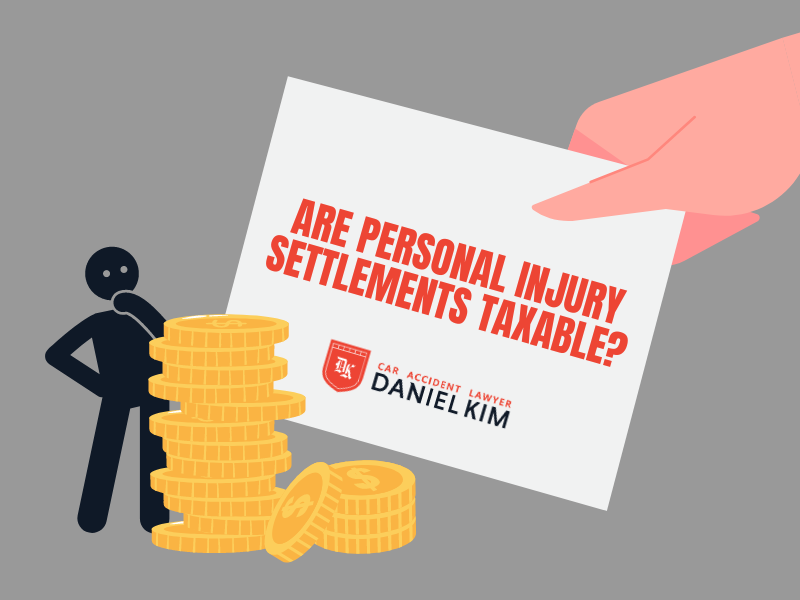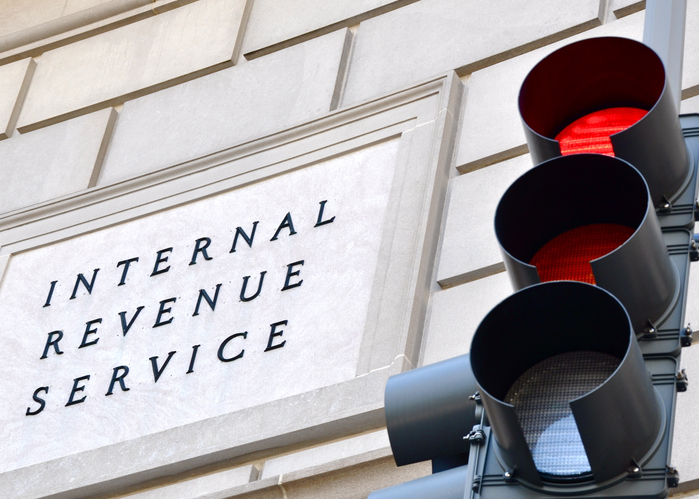Are Personal Injury Settlements Taxable in California?

Experiencing a car accident can be one of the most challenging and overwhelming moments in life. If you have gone through the process of filing a car accident claim and recovered compensation, you may be wondering: is my personal injury settlement taxable? Some portions of your settlement may be exempt from taxes, while others could be taxable.
In this blog, we’ll guide you through the process of how taxes may apply to your settlement and what you need to know when dealing with the IRS.
How Much Tax Do You Pay On a Personal Injury Settlement?
A personal injury settlement can be taxable, nontaxable, or partially taxable. This will all depend on the type of case and the compensation for the injuries suffered.
Typically, a personal injury settlement’s taxable status will depend on whether there was a “physical injury or physical sickness.” Until 1996, a personal injury settlement (physical or emotional injuries) was mostly tax-free. Nowadays, the laws are much more restrictive. Generally, physical injuries and sickness are non-taxable.
Suppose a defective airbag injures Jason, resulting in almost $20,000 in medical expenses. The airbag company willingly settles with Jason for $20k. This personal injury settlement will be tax-free, and Jason will not have to report it on a tax return.
Like most legal situations, there are always exceptions, and if Jason deducted the $20,000 in medical expenses in a prior tax return, the settlement will be taxable.
When a personal injury settlement with a monetary award is based partially on mental anguish or emotional distress, it might be tax-free. If the pain and suffering are directly related to a physical injury, then it is considered “medical” and would be non-taxable.
What Parts of a Personal Injury Settlement Are Taxable?
Personal injury claims, most notably car accident settlements, can consist of compensatory damages and punitive damages. There are two types of compensatory damages: economic and non-economic. Economic damages include financial losses, such as medical bills and lost income. Non-economic damages cover intangible losses, such as pain and suffering. Generally, compensatory damages are not taxed.
While rarely awarded, punitive damages are meant to punish the defendant for egregious acts or gross negligence and prevent future bad behavior. According to IRC Section 104(a)(2), punitive damages and interest are taxable at federal and state levels. The only exception is for wrongful death cases.
If you receive punitive damages, consult a tax attorney and a personal injury attorney to determine whether your settlement is taxable.
Can the IRS Take Taxes Out of My Settlement?
The Internal Revenue Service (IRS) typically does not take taxes from personal injury settlement funds. As discussed above, if the personal injury award is for personal or physical injuries, it does not need to be reported as income.
However, when it comes to certain parts of your settlement, the IRS may take taxes, including the following:
Lost Wages
Since everyone, including personal injury victims, pays income tax, the IRS may tax the portion of your settlement that compensates for lost income. These are considered taxable income and should be reported accordingly.
Medical Expenses
If the victim previously claimed medical expenses as a deduction on a past tax return, the portion of the settlement reimbursed for those expenses may be subject to taxation. This is to prevent double-dipping on tax benefits.
Emotional Distress and Mental Anguish
While compensation for physical injuries is generally tax-free, emotional distress and mental anguish settlements can be taxable unless they stem directly from a physical injury. The IRS may require you to report the portion of your settlement related to non-physical damages.
Wrongful Death
If a person dies due to the negligence of another person or entity, the surviving family members can file a wrongful death claim to recover their losses, such as funeral and burial expenses. As with most personal injury cases, most settlements from wrongful death cases are not taxable.
Car Insurance Settlement for Lost Wages Is Taxable
When you receive compensation for lost wages, it’s meant to replace the income you would have earned if you hadn’t been injured. If your recovery is incomplete, you may also receive compensation for future lost income.
A common question is: “Why do I have to pay taxes on an insurance settlement for lost wages?” The answer is that since wages are taxable, any compensation for your income is also subject to taxes.
This situation can be tricky because you may be taxed on several years of income in the year you receive the settlement. For example, if you typically earn $35,000 per year and are taxed at 15% but receive three years’ lost income in a lump sum ($105,000), you could be pushed into a higher tax bracket, resulting in a more significant tax burden.
Additionally, you’ll need to pay Social Security and Medicare taxes on the portion of the settlement allocated to lost wages, just as you would with regular income. Consulting a tax professional can help you navigate this complex situation and minimize the financial impact.
Should I Still Report My Settlement on My Tax Return?
You should still report your personal injury settlement on your tax return, even if portions of it may not be taxable. This helps ensure transparency and compliance with IRS regulations.
Typically, settlements that include taxable components—such as lost wages or punitive damages—will be reported on Form 1099-MISC, which you may receive from the party paying the settlement. The form will reflect any taxable amounts, which should be reported on your tax return.
Even if your settlement is entirely for personal physical injuries and is considered non-taxable, it’s smart to consult with a tax professional. They can confirm whether any portion of your settlement, such as interest or medical expense reimbursements, needs to be reported or taxed.
How To Reduce Your Accident Injury Settlement Tax Obligation
If you were injured in an accident and received a financial settlement that included compensation for lost wages and pain and suffering, you will most likely be paying federal income taxes. There are ways to help minimize the amount of taxes you might pay.
Structured Auto Insurance Settlement
If you are awarded a large settlement, you can avoid some taxes by having your money paid to you in periodic payments over an extended number of years instead of a lump sum.
This structured settlement may let you exclude some of the income payout from current taxes.
Classifying Damages in Your Car Accident Settlement
There are two categories of damages when you sue another driver: general and special. General damages are usually more subjective and include non-taxable pain and suffering.
The goal is to obtain a tax-friendly (paying less taxes) settlement.
Get Legal Advice From The Law Offices of Daniel Kim
If you’re navigating a personal injury claim, it’s essential to reach out to an experienced personal injury attorney for clear guidance on tax laws related to your settlement. Don’t settle for less—contact our law firm today for a free consultation and pursue the maximum compensation you deserve.
At The Law Offices of Daniel Kim, our clients always come first. Don’t face the insurance companies alone; let an experienced personal injury lawyer advocate for you. Our award-winning team specializes in motor vehicle accident cases. Plus, you don’t pay a fee if we don’t win your case.
We proudly serve clients across California with offices statewide. Contact us today at (800) 719-9779 for a free case evaluation.




